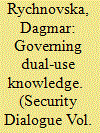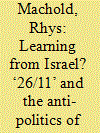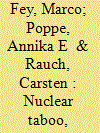|
|
|
Sort Order |
|
|
|
Items / Page
|
|
|
|
|
|
|
| Srl | Item |
| 1 |
ID:
147322


|
|
|
|
|
| Summary/Abstract |
Biosecurity is a concern in many parts of the world but is differently conceived and addressed depending on context. This article draws on two cases concerned with life sciences research involving dangerous pathogens, one in the United States and one in Israel, to examine this variability. In both cases, concern revolves around issues of biosafety and bioterrorism, which are targeted by similar policies and solutions. The cases, nevertheless, differ. In the United States, biosecurity is contextualized in the dynamics between science and society, and apprehension about research with dangerous pathogens focuses on the social risks and benefits of such research. In Israel, biosecurity is contextualized in the dynamics between science and the state and hinges on whether and how far the state should restrict scientific freedom. In view of this difference, the authors advocate the development of a nuanced concept of biosecurity capable of describing and explaining local permutations. They suggest reconceptualizing biosecurity as a boundary object that mediates between competing domains and that takes variable form in efforts to resolve the problem of securing life.
|
|
|
|
|
|
|
|
|
|
|
|
|
|
|
|
| 2 |
ID:
147321


|
|
|
|
|
| Summary/Abstract |
Fears of malicious non-state actors and potentially dangerous research have given rise to new efforts to secure science against misuse. With the rapid advancements of science, what receives attention in security politics is how to oversee not only material and technology but also knowledge. This article explores the emerging security governance of knowledgeable practices in life sciences and critically reflects on its possible implications. The article first contextualizes the current understanding of the dual-use dilemma in life sciences in prior discourse on science–security relations and argues that security concerns have converged with ethical dilemmas related to the governing of science. Drawing on critical theory, security studies and science studies, it then conceptualizes dual use as a problem of organizing circulations and suggests that policing scientific knowledge through the establishment of a ‘culture of responsibility’ can be understood as a part of broader shifts towards the subjectification of knowledge. Using examples from life sciences, the article analyses how practices of knowledge production and circulation are adjusted to the logic of security. The article concludes that the converging political rationalities and governmental techniques of responsible science and security risk management, understood as an ‘ethicalization’ of security, affect the politicization of security expertise, prospects of resistance and the democratic accountability of science.
|
|
|
|
|
|
|
|
|
|
|
|
|
|
|
|
| 3 |
ID:
147319


|
|
|
|
|
| Summary/Abstract |
This article calls for a greater emphasis on issues of politics and anti-politics within critical debates about transnational security governance in the metropolis. While scholars have documented the growing popularity of policy ‘models’ and ‘best practices’ in policing and urban security planning, we know little about what makes these schemes attractive to the officials who enroll in them. I take the government of Maharashtra’s decision to ‘learn from Israel’ following the 2008 Mumbai attacks (26/11) as an invitation to re-evaluate the relationships among policymaking, politics, and depoliticization. Focusing on references to Israeli security know-how as a ‘best practice’ by Maharashtra state officials, I explore how an association with Israel was used to negotiate the conflicts and controversies that followed 26/11. The article has two aims: first, it addresses how transnational policy schemes work anti-politically within particular local contexts. Second, it locates counter-terrorism policy as a form of performative politics, which is generative of policy problems. In doing so, the article helps to reclaim the political contingency of policy responses to terroristic violence and addresses the agency of policy actors in the global South.
|
|
|
|
|
|
|
|
|
|
|
|
|
|
|
|
| 4 |
ID:
147323


|
|
|
|
|
| Summary/Abstract |
The nuclear age has been characterized by an emerging and now well-established norm of nuclear non-use, the ‘nuclear taboo’. In the realistic and naturalistic setting of the science-fiction TV series Battlestar Galactica, however, nuclear weapons are used frequently and at times massively. Claiming that science fiction can function as an illuminating ‘mirror’ for international relations scholarship and that we can learn something from ‘second-order’ (fictional) worlds, this article explores potential in-show reasons that render the absence of a nuclear taboo plausible within the universe of Battlestar Galactica. We turn to the central pillars of the nuclear taboo in the real world and find them reversed in the show: nuclear weapons are (depicted as) ‘clean’, international institutions are absent, and the enemy is socially constructed as a ‘radical other’, thus rendering the possibility, if not likelihood, of nuclear war plausible. With these insights, we return to our world and argue that, particularly during the years of the George W Bush presidency, the erosion tendencies of the nuclear taboo were indeed quite serious: technological progress and growing political inclination expedited plans to develop usable nuclear weapons, arms control regimes came under considerable strain, and opponents were portrayed as ‘unjust enemies’ or ‘rogues’.
|
|
|
|
|
|
|
|
|
|
|
|
|
|
|
|
| 5 |
ID:
147320


|
|
|
|
|
| Summary/Abstract |
This contribution asks how the reliance on mass dataveillance of travellers is sustained as a central policy option in the governance of EU border security. It examines this question by analysing a recent initiative of the European Commission proposing the establishment of EU ‘smart borders’. The analysis draws from a set of thinking tools developed by the sociology of association in the field of science and technology studies. The contribution argues that in order to grasp policy outcomes such as smart borders, security studies would benefit from adopting a compositional outlook on agency, where action is seen as the effect of associated entities. Looking at the smartening of EU borders, the article finds that this process is held together by multiple translations and enrolments through which the technical side of dataveillance – platforms, automated gates, matching systems, and so forth – has become associated with the processes of policymaking on border security and sustains the furtherance of mass dataveillance.
|
|
|
|
|
|
|
|
|
|
|
|
|
|
|
|
|
|
|
|
|